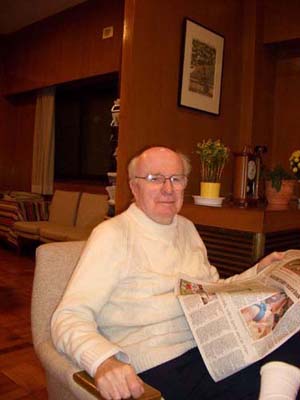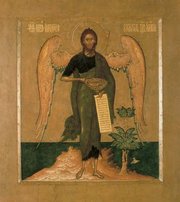
On Adoration...Silence....
Carlo Carretto (1910-1988)
Carlo Carretto was a leader in Italian "Catholic Action" and served as National President of Catholic Youth from 1946 to 1952. At the age of forty-four he heard the call of God to go into the desert. There he joined the Little Brothers of Jesus of Charles de Foucauld.
*********
The great joy of the Saharan novitiate is the solitude, and the joy of solitude - silence, true silence, which penetrates everywhere and invades one's whole being, speaking to the soul with wonderful new strength unknown to men to whom this silence means thing.
Here, living in perpetual silence, one learns to distinguish its different shades: silence of the church, silence in one's cell, silence of work, interior silence, silence of the soul, God's silence.
To learn to live these silences, the novice-master lets us go away for a few days' "desert."
A hamper of bread, a few dates, some water, the Bible. A day's march: a cave.
A priest celebrates Mass: then goes away, leaving in the cave on an altar of stones, the Eucharist. Thus, for a week one remains alone with the Eucharist exposed day and night. Silence in the desert, silence in the cave, silence in the Eucharist. No prayer is so difficult as the adoration of the Eucharist. One's whole natural strength rebels against it.
One would prefer to carry stones in the sun. The senses, memory, imagination, all are repressed. Faith alone triumphs, and faith is hard, dark, stark.
To place oneself before what seems to be bread and to say, "Christ is there living and true," is pure faith.
But nothing is more nourishing than pure faith, and prayer in faith is real prayer.
"There's no pleasure in adoring the Eucharist," one novice used to say to me. But it is precisely this renunciation of all desire to satisfy the senses that makes prayer strong and real. One meets God beyond the senses, beyond the imagination, beyond nature.
This is crucial: as long as we pray only when and how we want to, our life of prayer is bound to be unreal. It will run in fits and starts. The slightest upset - even a toothache - will be enough to destroy the whole edifice of our prayer life.
"You must strip your prayers," the novice master told me. You must simplify, de-intellectualize. Put yourself in front of Jesus as a poor man: not with any big ideas, but with living faith. Remain motionless in an act of love before the Father. Don't try to reach God with your understanding; that is impossible. Reach him in love; that is possible.
The struggle is not easy, because nature will try to get back her own, get her dose of enjoyment; but union with Christ Crucified is something quite different.
After some hours - or some days - of this exercise, the body relaxes. The will refuses to let it have its own way it gives up the struggle. It becomes passive. The senses go to sleep. Or rather, as St. John of the Cross says, the night of senses is beginning. Then prayer becomes something serious, even if it is painful and dry. So serious that one can no longer do without it. The soul begins to share the redemptive work of Jesus.
Related reading:






